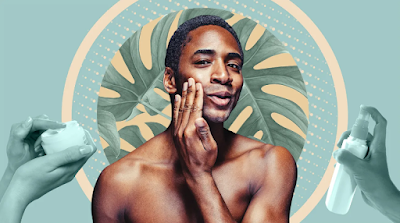Everyone wants glowing, healthy skin. But sometimes that seems like an impossible dream for some of us. From wrinkles to acne breakouts, you might think your skin is simply destined to look bad no matter what you do. Good news: it isn't! In fact, there are many things you can do to keep your skin looking great, and we've compiled a list of all the tips dermatologists swear by. Read on for a few ways to make sure your skin looks amazing every day — and if you need more help, consult a licensed dermatologist for personalized advice.
Use the correct cleanser
For maximum results and minimal irritation, choose a cleanser that's appropriate for your skin type. While face wash is all-purpose, facial cleansers are formulated to target specific skin concerns.
A good place to start is with something labeled as "gentle" or "sensitive." This can include products formulated for dry or sensitive skin types and those made for eczema-prone complexions like those of babies and young children. The idea here is that milder formulas are less likely to irritate delicate skin than those made with ingredients like sodium lauryl sulfate (SLS), an ingredient found in many mainstream products that are known to cause redness or swelling in some people with sensitive complexions.
Don't use too many products
- Use products that are the right type for your skin type.
- Use products that are the right type for your skin concern.
- Use products that are the right type for your skin tone.
- Use products that are the right type for your skin texture.
Moisturize both day and night
It's important to moisturize both day and night. When applying your daily moisturizer, don't skip this step, even if you're not planning on wearing makeup. Even if you're going bare-faced (a.k.a., no makeup), it's still essential to moisturize your face before bed because doing so helps keep skin hydrated overnight and can help prevent wrinkles in the long run.
When applying your nightly moisturizer, always apply it to damp skin—not dry skin—and try to use a thin layer of the product instead of drenching your face with oil or lotion. The best way to apply a night cream is in circular motions from side to side for maximum absorption into the skin without causing any redness or irritation.
Don't touch your face
If you touch your face, you're probably not doing it for the best reasons. This can include picking, rubbing, or scratching at your skin, which is never a good idea. The oils on our hands can also transfer to our faces when we touch them and cause breakouts or irritation.
Also, avoid touching any part of your face with dirty hands—you may think they are clean but they could still be carrying bacteria from other areas of your body (or someone else's).
Try not to rub your eyes too much either; this can lead to irritation around the eyelids and make them red and puffy. If you do rub them gently use clean hands so that there aren't any bacteria transferred into the eye area. And don't forget to avoid rubbing noses either!
Hydrate inside and out
Hydration is key to a healthy, glowing complexion. It's not just about drinking enough water, though—it's also about keeping your skin hydrated from the inside out. Drink enough water. Your skin needs to be hydrated in order for it to look and feel its best, so make sure you're drinking enough water every day. Try aiming for 64 ounces of H2O (that's 8 cups) each day—you'll reap all kinds of benefits from this simple habit including increased energy levels and better sleep quality!
- Choose a moisturizing cleanser with hyaluronic acid or salicylic acid in it. These ingredients help retain moisture in your skin by locking it into place when applied daily after cleansing the face with warm water first before applying this type of product thoroughly onto dampened areas such as eyebrows (which tend to need extra attention because they're usually neglected due being small but very noticeable if left untreated).
Avoid direct heat exposure
Avoid direct heat exposure-The skin is your body's largest organ, and it is easily damaged by harsh treatments. Hot water will dry and damage your skin, causing it to age faster. If you have sensitive or dry skin, avoid hot showers, baths, and soaks altogether; instead, use warm water in moderation.
If you're worried about being too cold when it's freezing outside (or even when it isn't), try a heated towel rack or electric blanket instead of turning up the heat on your shower or bathtub.
For those who love taking long hot showers: just know that while they might seem like they're making you feel good at first (especially if they help alleviate stress. As mentioned above direct heat exposure—can cause irritation to the skin which leads to premature aging issues later on down the road as well!
Exfoliate a couple of times per week
- Exfoliating is a powerful tool to have in your skincare arsenal. It helps remove dead skin cells, which can clog pores, causing blackheads and whiteheads (AKA acne).
- When you're exfoliating, it's important not to be too aggressive. The goal is not to scratch off all the top layers of skin; it's rather just to gently remove any dry flakes or buildup that might otherwise cause issues down the road.
Vitamins should go on your skin, not just in it
Instead of swallowing a handful of pills, it's best to apply the vitamins directly to your skin.
Vitamin A, for example, is great for combatting acne and signs of aging like fine lines and wrinkles. But when you take vitamin A orally instead of applying it topically (directly to the skin), less than 10% will actually get absorbed into your system — leaving most of that vitamin in your digestive tract where it does nothing for your skin at all.
If you're looking for an easy way to improve the look and feel of your complexion without spending hours on research or shopping trips, then this tip is for you!
Get your greens — on your plate and on your face
While there are plenty of dietary tips for healthy skin, one that seems to get overlooked is the importance of eating fruits and vegetables. Fruits and vegetables are great sources of antioxidants, which can help protect your skin from sun damage. Some studies have shown that people who eat more greens have healthier skin than those who don't.
One study found that people who ate more than six servings of fruits or vegetables each day had fewer wrinkles as well as less age-related dryness around their eyes and mouths. And another study showed that women with higher levels of vitamin C in their blood had fewer fine lines on their faces.
You don't have to be a vegetarian or vegan to reap the benefits; just make sure you're getting enough green vegetables in your diet each week (about two cups).
Maintain a healthy diet, especially if you suffer from acne
- Eat a balanced diet.
- Avoid junk food.
- Avoid foods that trigger acne, including greasy foods like fried chicken and pizza.
- Avoid foods that cause acne, including dairy and sugary foods such as candy bars or cupcakes. This is a good time to kick the soda habit too – even though it’s not technically a food, drinking soda can lead to skin problems like acne and rosacea by triggering inflammation in your body. It also dehydrates you, which can make your already irritated complexion feel drier than ever before! Water is your new best friend when it comes to skincare: drink lots of it every day for an extra boost of hydration (and because healthy people are happy people).
One thing we want you to remember above all else when it comes to maintaining your best possible complexion: don’t stress out about skincare! While some products might be more effective than others from an efficacy standpoint (meaning they work better), nothing beats good old-fashioned self-care when it comes down to doing what really matters most—looking amazing!
Clean your makeup brushes regularly to prevent breakouts
Cleaning your makeup brushes regularly can help prevent breakouts and keep you looking great. The build-up of dirt, oil, and bacteria from applying makeup to the same brush multiple times a day can cause acne.
To clean your brushes:
- Wet them under warm water, then gently swirl them on a towel to remove any excess moisture.
- Apply an antibacterial cleanser (like baby shampoo) directly to the bristles and gently massage it into each bristle for a few seconds using light circular motions until most of the product is gone; rinse thoroughly under running water or in a bowl with warm water—make sure all traces of shampoo are removed before drying them off!
- Lay flat on paper towels so they dry completely before storing them back in their original container or case (which will keep them cleaner longer).
Sleep smarter by wrapping your hair up at night and switching to angled pillows when you have a breakout so you're not sleeping on it punctuating the problem area with pressure
Sleep smarter by wrapping your hair up at night and switching to angled pillows when you have a breakout so you're not sleeping on it punctuating the problem area with pressure. Silk pillowcases are super soft and prevent breakouts, frizz, and damage to your hair, among other benefits. A silk pillowcase will also protect your face from acne-causing bacteria that can be transferred by touching it while you sleep—so try out this easy trick!
Conclusion
As you can see, being smarter about your skincare habits can make a big difference in the look and feel of your skin. By incorporating these suggestions into your day-to-day routine, you can expect to see clearer, healthier skin that's less prone to breakouts and irritation. But remember — it's always a good idea to consult with a dermatologist or other skin care professional if you have any concerns about products or routines that might be causing issues for you!
You also can read: Easily overcome the deficiency of vitamin C










0 Comments